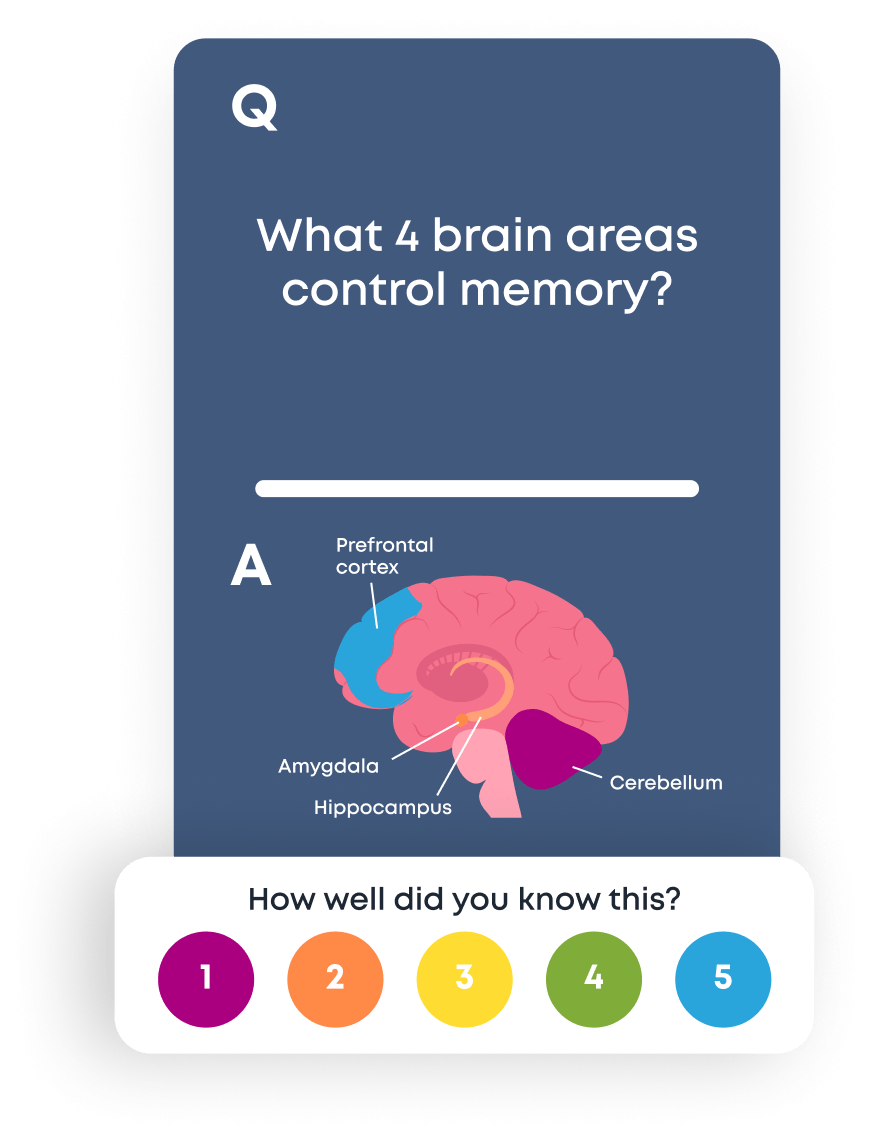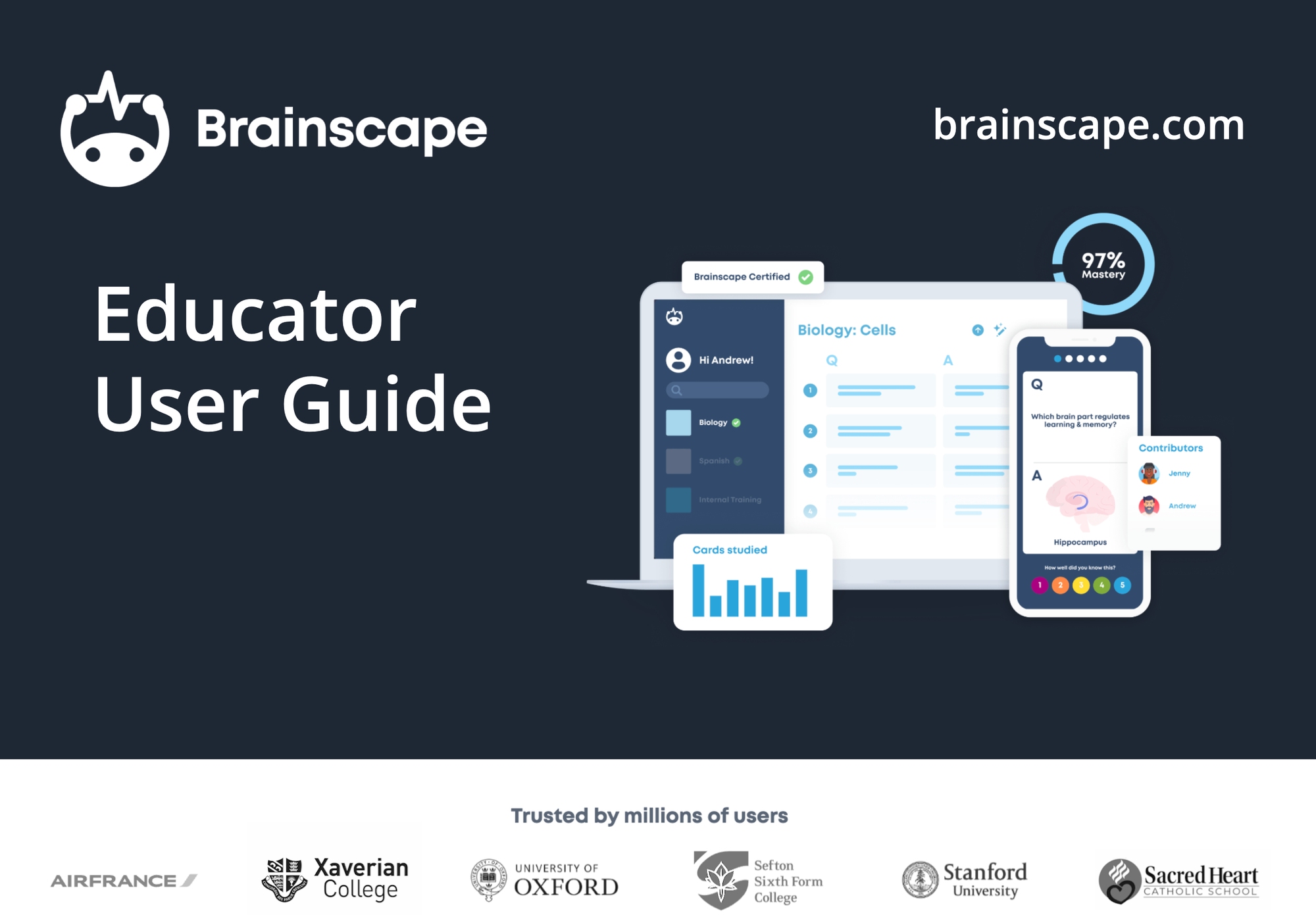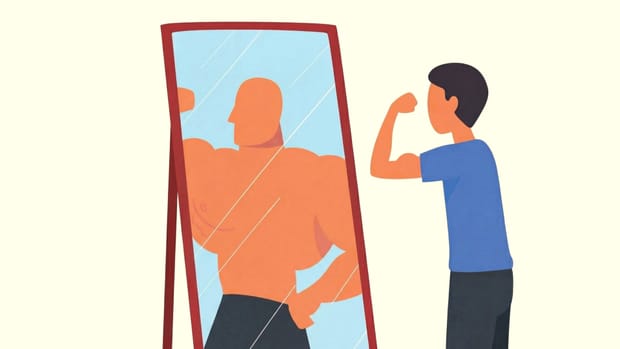This article is part of Brainscape's Science of Studying series.
You’ve just finished a lecture, closed your notes, and think, “Yeah, I’ve totally got this.” Then exam day rolls around and **plot twist** you don’t “got this”.
That gap between what you thought you knew and what you could actually recall? That’s the terrain of Judgments of Learning, or JOLs. The accuracy of that assessment? That’s resolution.
Together, JOLs and resolution form the backbone of effective learning: they determine whether you spend your time mastering what matters or endlessly rereading what you already know.
That’s why this article is such an important read for any learner or educator. In it, we’ll explore how these two forces shape your study efficiency, why your brain is often terrible at judging memory, and how tools like digital flashcards from apps like Brainscape or Anki can help you calibrate your inner compass!
What Are Judgements of Learning (JOLs)?

Judgements of Learning or JOLs are your internal estimate of how well you’ve learned something: your brain’s self-rating of its own knowledge. Every time you mentally predict, “I’ll remember this later,” you’re making a JOL.
But JOLs aren’t always accurate.
The same way your brain can convince you to watch just one more episode of ‘Killing Eve’ (in the hopes that Sanda Oh and the hot Russian assassin will finally make out), so too can it erroneously estimate your mastery of a subject.
And this is because, sometimes, your brain confuses familiarity (“this looks familiar”) with mastery (“I actually understand this”). You can feel fluent with material you’ve just reread and still forget it a day later.
That’s where resolution comes in: the science of how accurate your self-judgments actually are.
What Is “Resolution,” and How Does It Relate to JOLs?
If JOLs are your confidence ratings, resolution is how well those ratings line up with reality.
Psychologists define resolution as the correlation between your predicted performance (your confidence) and your actual performance later. High resolution means your self-assessments accurately mirror how well you’ll recall the information. Low resolution means your inner “I know this” detector is lying to you.
Think of it like a weather forecast for your brain. A high-resolution learner says “there’s an 80% chance I’ll remember this tomorrow” and actually does. A low-resolution learner predicts sunshine and gets a hurricane.
High resolution helps you trust yourself as a learner. It’s what makes your study decisions (like whether to review a topic again or move on) truly efficient. Without good resolution, you’re essentially flying blind.
The good news?
Resolution is a totally trainable skill and we’ll show you how to do that in just a little bit.
But first…
Where Did the Ideas of JOLs and Resolution Come From?
Both Judgments of Learning and Resolution emerged from the field of metamemory: the study of how we think about our own memory. (That’s some “meta” sh— right there!)
In the 1970s and 1980s, researchers like Janet Metcalfe and Thomas O. Nelson began asking: Can students actually predict what they’ll remember later? The answer: yes, but not very well at first. Over decades of experiments, cognitive psychologists found that people’s JOLs often rely on heuristics*, rather than genuine understanding.
(Ermegherd, what are heuristics? See next subheading.)
Later research refined these insights, showing that resolution can improve over time with feedback and self-testing. In other words: you can train your brain to make more accurate self-assessments, which is exactly what effective learners and adaptive study systems do!
Whert the Ferk er Heuristics?

Heuristics are mental shortcuts or "rules of thumb" that allow people to make decisions, judgments, and solve problems quickly and efficiently. Imagine if every time you made a decision, you had to think through every detail and eventuality. It would take ages! And feel very overwhelming.
Instead, the brain is a smart, efficiency-obsessed organ. It builds complex mental models that allow you to make swift decisions based on data you’ve collected through your social, physical, and cultural environment.
So, back to my original point on people’s JOLs relying on heuristics.
Not to flog that weather metaphor to death but think of it like your brain being a slightly overconfident weather forecaster. Instead of checking actual barometric data (how well you’ve really encoded the information), it looks out the window and says, “The sky looks clear, so it probably won’t rain.”
In the same way, your brain assumes, “That paragraph felt easy to read, so I must know it.”
When in fact you don’t.
Let’s take a peek under the hood of your brain to better understand what’s going on.
How Do JOLs and Resolution Work, Cognitively?
JOLs are your brain’s way of monitoring and controlling learning. Here’s how the cycle works:
- Monitoring: You study a concept and ask, “Do I know this?”Your brain quickly checks cues (like familiarity, fluency, ease of recall) and assigns a confidence level.
- Control: Based on that judgment, you choose your next action: review again, move on, or test yourself.
- Feedback: When you test yourself later and see whether you were right or wrong, your brain updates its internal model, thereby sharpening future judgments.
Resolution is the measure of how well that loop works. If your confidence consistently matches your performance, your resolution is high. If you keep overestimating or underestimating yourself, your resolution is low.
Neurologically, this process draws on prefrontal regions responsible for monitoring and decision-making, hippocampal networks involved in memory encoding, and dopaminergic systems that reward accurate predictions.
In English: your brain literally releases reward signals when your self-assessment matches reality, reinforcing better metacognition.
It feels good to be right.
Why Do JOLs and Resolution Matter for Learning?

In case it wasn’t clear by now, JOLs and resolution matter because your study efficiency depends on them.
When your JOLs are off, you waste time reviewing what you already know, or worse, skipping what you don’t. This is known as an illusion of competence: the comforting but dangerous belief that you’ve mastered something when you haven’t. (I have that all the time when I go to karaoke with friends, taking on songs that are way above my skill level.)
But when your resolution is high, studying becomes laser-targeted. You instinctively know which material needs more attention, which can wait, and when it’s time to test yourself again.
Educators love this too: training students to make and evaluate JOLs helps them become self-regulated learners: learners who can take charge of their progress and not just follow instructions like brain-dead sheep. (Wait, is that tautology?)
Research consistently shows that improving JOL accuracy leads to stronger long-term retention and better academic performance (Ariel et al., 2021; Undorf & Murdock, 2024).
In short: if you can predict your memory accurately, you can control it more effectively.
How Can You Strengthen Your Resolution (and Make Better JOLs)?
The good news is that you can train your brain to make better Judgments of Learning, and one of the simplest, most evidence-based tools for doing so is the humble flashcard. (Specifically, digital flashcards for web and mobile because we dwell in the 21st Century.)
Used properly, digital flashcards are powerful metacognitive trainers. Every card you flip over forces you to do three things that sharpen your self-awareness: recall information, judge your confidence, and compare that judgment to reality. That’s the heart of building resolution.
If you want a quick gut-check on whether your current study habits are actually improving your JOL accuracy, the infographic below makes the distinction crystal clear. It shows which strategies only create a feeling of fluency, and which ones force the retrieval and meaning-making that sharpen resolution.

Here’s how to turn your study routine into a self-calibrating feedback loop…
1. Make Confidence Ratings Explicit

After answering a flashcard, don’t just move on: rate your confidence in that answer. Ask yourself: “How sure am I that I’ll remember this tomorrow?”
Flashcard apps like Brainscape or Anki automatically do this for you by prompting you to rate your confidence on a scale of 1 to 5 with 1 being “I didn’t know this at all” and 5 being “I’m 100% confident I won’t ever forget this”. It then repeats those cards based on your unique strengths and weaknesses, with your weak cards showing up more often and your strong cards much less often.
This is a nifty concept called confidence-based repetition and it’s proven to dramatically boost knowledge retention and learning efficiency. But we’re talking about what happens before the flashcard app repeats cards for you: the metacognitive exercise of rating how well you knew each flashcard.
You see, every time this happens, you’re not only recalling the fact; you’re training your internal accuracy meter.
Over time, these confidence ratings teach you to distinguish between feeling familiar with information and actually knowing it. Those digital flashcard apps I mentioned make this effortless by having confidence scoring baked right into the learning process, which is why I recommended them.
2. Use Delayed Judgments
If you rate your confidence right after studying, your brain’s still “warm” from exposure. So, it probably feels like you know the material better than you do.
This is yet another reason why spacing out your studies is so critically important (rather than cramming everything at once right before a test or exam). When a concept resurfaces a few hours or days later, your rating will reflect true retention, not short-term familiarity.
Digital flashcards can be tailor-made for this kind of spaced review: their spaced-repetition algorithms automatically resurface cards at precisely timed intervals, so each confidence judgment becomes a more honest test of long-term memory. (Of course, not all digital flashcard apps have the kind of sophisticated study algorithms I’m talking about here, which is why I keep mentioning Brainscape and Anki, which do.)
3. Test Yourself… Often
Every time you answer a question on the content you’re learning—whether it’s in flashcard format, a practice test, question bank, or even moment of self-reflection—you compel your brain to reach back into its vast storehouse of knowledge to find the answer.
That’s retrieval practice, and, paired with self-reflection afterwards, it’s the single best way to improve resolution. By repeatedly testing yourself, and then assessing how well you did, you generate hard data on how well your judgments match reality.
Over time, you’ll start noticing patterns: “I tend to overrate my confidence on physiology terms but underrate it on anatomy.” That’s calibration in action: the process of aligning your JOLs with your actual memory strength.
4. Reflect on Errors
The moments you get a question or flashcard wrong, especially one you were sure you knew, are pure gold for metacognitive growth. (So don’t rush it or chastise yourself!)
Pause before you rush ahead. Ask: Why did I misjudge that? Was it because the question’s phrasing tricked me? Because the topic only felt familiar?
That reflection teaches your brain to spot its own blind spots.
Digital flashcards amplify this process because you’ll see that same question again soon, giving you a second (and third and fourth) chance to test whether your revised self-assessment holds up.
5. Let Adaptive Flashcards Do the Heavy Lifting
If you couldn’t tell by now, I’m a total fangirl of flashcards. And that’s because, in adaptive flashcard systems, every confidence rating you make feeds an algorithm that decides when you’ll see that card again. Low-confidence cards come back sooner; high-confidence cards are spaced further apart.
This dynamic cycle of recall → rating → feedback → re-testing is resolution in motion. The software becomes your personal metacognitive coach, helping you correct overconfidence, detect weak spots, and build a more accurate sense of what you truly know.
This is why a good flashcard app is one of the most powerful learning tools you can recruit for whatever learning you’re attempting to do, whether it’s for an upcoming school, college, or professional exam or simply (like me) to improve your birdwatching skills.

Even younger kids, who are typically not as good at resolution as teenagers, can be taught to improve their resolution using digital flashcard apps for ECE. This is one of the most important study skills that they will take with them for the rest of their lives!
So, What’s the Takeaway?
Judgments of Learning are your mental forecasts; resolution is how accurate those forecasts are. Together, they determine whether your study time pays off, or vanishes into the void of false confidence.
Learning science shows that the best learners don’t just put in the time but they also accurately self-observe. They know when they know, and they know when they don’t.
By practicing self-testing, tracking your confidence, and using adaptive feedback systems that make your JOLs visible, you can dramatically increase both awareness and efficiency.
Digital flashcard apps like Brainscape embody this principle, helping learners sharpen their JOLs and resolution naturally every time they study, which is why I’m such a proponent of them.
And if you try it out, I know you’ll agree!
Get Brainscape's Educator User Guide
Curious to learn more about how to introduce Brainscape into your physical or virtual classroom? Our Educator User Guide provides a detailed walkthrough of how to get set up. It'll also give you all the material you need to motivate for its adoption amongst your students, their parents, and/or the faculty of your school or college:

Additional Reading
Want to go deeper? Explore the rest of our Cognitive Science of Learning series to understand more mental hacks behind how you learn, remember, and master knowledge!
- What is Cognitive Load Theory? (& Why Does Too Much Info Hurt Learning)
- What Is Scaffolding in Education (& How Does It Boost Learning?)
- Free Recall Explained: How to Train Your Brain to Remember More
References
Ariel, R., Karpicke, J. D., Witherby, A. E., & Tauber, S. K. (2021). Do judgments of learning directly enhance learning of new material? Educational Psychology Review, 33(3), 833-856. https://doi.org/10.1007/s10648-021-09635-6
Koriat, A., Bjork, R. A., Sheffer, L., & Bar, S. K. (2024). What guides the judgment of learning: Memory or heuristics? Journal of Experimental Psychology: General. Advance online publication. https://doi.org/10.1016/j.jepg.2024.100001
Metcalfe, J., & Finn, B. (2008). Evidence that judgments of learning are prone to error and how to improve them. Psychological Science, 19(7), 605-611. https://doi.org/10.1111/j.1467-9280.2008.02157.x
Metcalfe, J., & Schraw, G. (2021). Metacognition: Knowing about knowing. Educational Psychology Review, 33(3), 915-943. https://doi.org/10.1007/s10648-021-09671-2
Undorf, M., & Murdock, K. A. (2024). Making judgments of learning either enhances or impairs subsequent memory: Evidence from 17 experiments. Collabra: Psychology, 10(1), 117108. https://doi.org/10.1525/collabra.117108
Rhodes, M. G. (2015). Judgments of learning: Methods, data, and theory. In A. M. Bohannon (Ed.), Handbook of Metamemory and Memory (pp. 116-130). Academic Press.
Son, L. K., & Metcalfe, J. (2005). Judgments of learning and improvement. Journal of Experimental Psychology: Learning, Memory, and Cognition, 31(4), 927-939. https://doi.org/10.1037/0278-7393.31.4.927
Undorf, M., & Onwuegbusi, C. (2024). Judgment of Learning: A Human Ability Beyond Generative Artificial Intelligence. arXiv. https://doi.org/10.48550/arXiv.2410.13392
